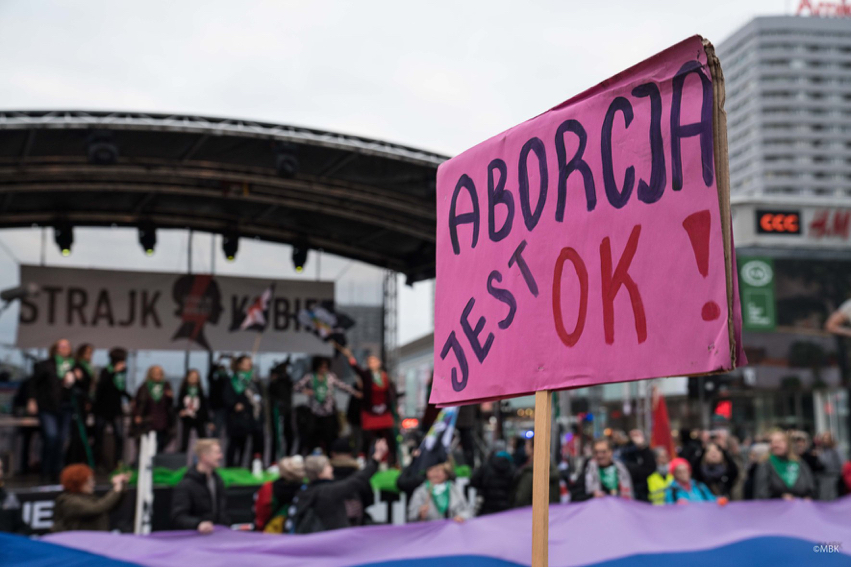Polish Citizens Storm the Streets in Response to Abortion Ban
This past week, thousands of protesters took to the streets in Warsaw, Poland following the announcement of the Constitutional Tribunal Ruling on abortion. This near-total ban on abortion prevents women from terminating pregnancies with fetal defects, which account for 98% of legal abortions in Poland. With good reason, protestors fear that this ban is a precursor for greater concern: the jeopardization of human rights in a country with an increasingly conservative agenda.
This ruling limits women’s access to legal termination with the exception of only two instances: the danger of the woman’s health and the case of rape or incest.
Many of the demonstrations in Warsaw were organized by the Women’s Strike. This feminist group led women in solidarity with LGBTQ+ and environmental activists through the streets toward the ruling party’s headquarters.
Among these protestors was Ola Borkowska, 31, who told NBC News that she feels the government is “targeting many people’s rights, and not just women’s rights” with its “traditional but outdated values.” The government’s increasing negligence towards members of the LGBTQ+ community and frequent pushes to reinstate more conservative social norms further prove Bokowska’s point.
Poland’s Law and Justice Party, the PiS, is responsible for these changes. This right-wing populist party has become an undeniably dominant force in the country. With the support of the Catholic Church, the PiS has been successful in enforcing an anti-liberal regime. However, at what point do these conservative changes infringe on basic human rights?
Members of opposing political parties have spoken out against PiS Chief and Country Deputy Prime Minister Jarosław Kaczyński. Civic Platform Party MP Dariusz Rosati openly criticized the police force and administration on Twitter, writing, “They protect Kaczyński. The guest responsible for the destruction of the state, for setting Poland on fire, for unleashing hatred. Disgrace.”
Even the mayor of Warsaw, Rafał Trzaskowski, stood by protestors. Following the announcement of the ruling, he took to Twitter to encourage Poles to publicly oppose the government’s decision, despite the country’s nationwide pandemic restrictions.
This ban sets the country apart from the many European countries moving in a more progressive and liberal direction. Poland is one of only six countries in the continent that does not allow abortion on a woman’s request or broad social grounds. The Center for Reproductive Rights reported that Poland has become one of the strictest European countries, with numerous attempts to rescind progressive laws in regards to women’s reproductive rights.
While this harmful ruling may seem unlikely to occur in the United States, some states are not far from administering laws and restrictions that parallel those of Poland.
In 2019, nine states passed bills to limit abortions within their borders. Stricter states like Alabama voted to ban abortion completely, while others like Georgia and Louisiana opted to pass “heartbeat bills.” These bills prevent women from requesting abortions after six to eight weeks of pregnancy when professionals are able to detect a fetal heartbeat.
While these laws are not as stringent as the Constitutional Tribunal Ruling in Poland, they too threaten the civil liberties of American citizens. Despite the countless protests that broke out in the US like those in Warsaw, many states are still actively pushing to reverse Roe v. Wade — one of the only Supreme Court decisions that explicitly protects women’s reproductive liberties in the country.
Both in Poland and some parts of the U.S., citizens fear the suppression of their human rights at the hands of an overly conservative government. Whether the offense may be a constitutional ban like that of Poland or a gradual bill like those of American states, one thing is certain: Laws that encroach on the rights of individuals’ volition are unethical and must be stopped.
As many Poles have expressed, this ban acts as a warning for all demographics, not just women. The silence of the Polish government speaks louder than words. If the PiS refuses to listen to the overwhelming response of its concerned citizens, who is to say they won’t pass more laws further restricting the voices of targeted groups?
The division that has erupted in Poland this week is severe — but perhaps necessary. While these protests may prove to be dangerous and upsetting for many, protestors are doing what is essential to protect their rights and the rights of others.
Student and active protester Dagmara, 25, said, “It’s my duty as a citizen to be here and fight for freedom. It’s the 21st century, and respect and tolerance for everybody is a must.”
The fight to preserve human rights is far from over in Poland, and protestors are not giving up. They have continued to express their concern with fervent demonstrations since the ruling has been announced.
“This is war,” said corporate worker Eliza. “We are protesting here. A group of women saying ‘no’ to our government and their decisions.”
Madeline Byrne, FCRH ’23, is a psychology major from Freehold, N.J.










































































































































































































